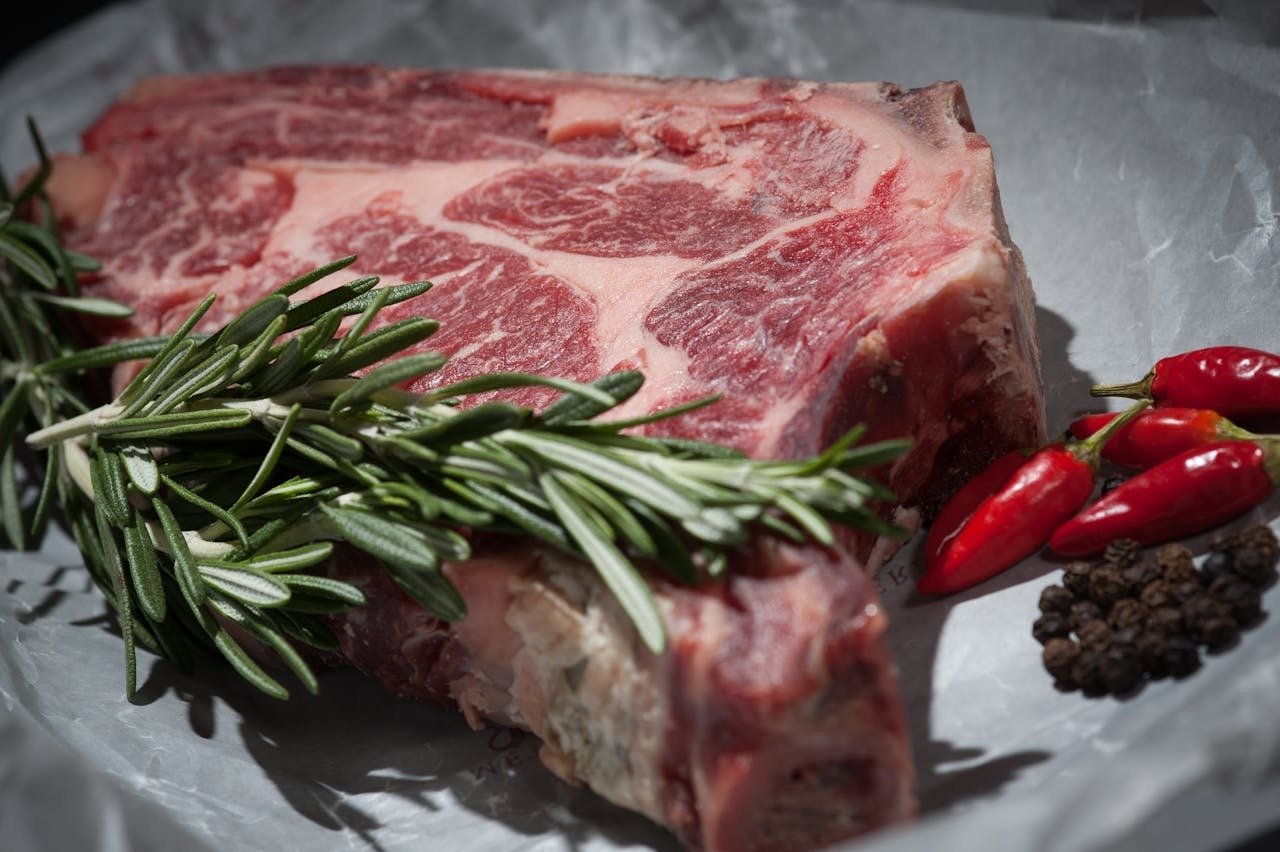Dive into the world of the carnivore diet, a way of eating that focuses on animal products like meat, eggs, and organic meats. This guide covers the basics of animal-based nutrition. It looks at the history and evolutionary reasons behind this diet.
Learn the main ideas of the carnivore lifestyle. Find out how to add high-quality, grass-fed animal products to your diet. This can improve your health and well-being.
The carnivore diet is different from what most people eat. It’s based on animal foods, not carbs. It’s popular for better health, more energy, and solving health problems.
Exploring the meat only diet, animal-based nutrition, and the carnivore lifestyle is eye-opening. It offers a new way to feed your body and mind.
Use our free Nutrition Guide Calculator to calculate your Calorie need
Understanding Animal-Based Nutrition Basics
The carnivore diet and animal-based diet are not the same. The carnivore diet only includes animal products and no plant foods. The animal-based diet lets you eat some carbs from organic fruits, raw honey, and raw dairy.
Defining the Carnivore Diet vs Animal-Based Diet
An animal-based diet includes high-quality meat, organs, fruits, honey, raw dairy, and eggs. Adding these carbs can help with hormones, sleep, energy, and performance.
Historical Background and Evolution
Our ancestors ate mostly meat from grass-fed animals like cattle and deer. They avoided meat from animals fed corn or soy. This animal-based diet helped them stay healthy.
Key Principles of Animal-Based Eating
- Focus on grass-fed, ruminant animals as your main protein source.
- Eat 1-3 ounces of organ meats like liver and heart every day.
- Add carbs from organic fruits, honey, milk, cheese, and maple syrup.
- Stay away from inflammatory vegetable oils like canola and soybean.
- Keep track of your macronutrients to meet your health goals.
By sticking to these rules, your animal-based diet will give you the nutrients you need.
“The animal-based diet is a powerful tool for optimizing health and performance, but it requires a thoughtful approach to ensure you’re getting all the essential nutrients your body needs.”
What Foods to Eat on the Carnivore Diet
The carnivore diet focuses on animal-based foods. It’s a detailed guide to what you can eat. At its heart, it includes grass-fed animals like beef, buffalo, goat, and lamb. These meats are rich in vitamins, minerals, and healthy fats, key for health.
Organ meats like liver, heart, and bone marrow are also key. They’re full of nutrients often missed in our diets. Eggs and certain dairy, like butter and full-fat milk, are okay in small amounts for some.
- Grass-fed beef, bison, lamb, and goat
- Poultry: chicken, turkey, duck, etc.
- Pork and other game meats
- Seafood: fish, shellfish, and other marine animals
- Eggs
- Dairy products: butter, ghee, heavy cream, cheese (for Intermediate Carnivore)
The Keto Carnivore diet is a bit more flexible. It lets in some plant-based fats and low-carb veggies like asparagus and spinach. This option is for those wanting a bit more variety while sticking to the diet’s core.
Success on the carnivore diet means eating high-quality animal proteins and fats. Avoid conventional meats, vegetable oils, and most plants. This diet can lead to many health benefits and change your life for the better.
Benefits of Animal-Based Eating
Following an animal-based diet, like the carnivore diet, can improve your health. But, it’s important to know the possible side effects. This way, you can make the right changes for your well-being.
Physical Health Improvements
Supporters of the carnivore diet say it can help with autoimmune issues, weight loss, and hormonal balance. Some people also see better physical performance and endurance.
Mental Health and Cognitive Benefits
The carnivore diet may also improve sleep and brain function. It might help with mental health issues like depression and anxiety by removing certain foods.
Transitioning to an Animal-Based Lifestyle
Switching to a diet like the carnivore diet is a big change from what most people eat. But, with a careful plan, it can be easy and rewarding. The most important thing is to go slow and listen to your body.
Begin by adding more high-quality meat, organs, and fats to your meals. You might start with three meat-only meals in the first week. Then, move to a full carnivore diet by the sixth week. Or, you could slowly cut down on carbs before going all in on meat.
For those who are really ready, you can start with only meat and water from the beginning. But, most people find it easier to start slowly. This way, you can get used to the changes without feeling overwhelmed.
While you’re making the switch, pay close attention to how your body feels. You might want to start with bone broth to help ease into it. Also, don’t forget to keep up with exercise, getting enough sunlight, managing stress, and sleeping well. These are all key parts of living an animal-based lifestyle.
As you get more used to eating only meat, you might notice big changes. You might not crave food as much anymore. You could also find it easier to resist tempting foods and enjoy social events without feeling controlled by food. And, you’ll likely find that meat is the only thing that really satisfies you.
Remember, changing to an animal-based lifestyle is a journey. Be patient and kind to yourself as you go. With the right attitude and support, you can make this change and enjoy all the benefits it brings.
Use our free Nutrition Guide Calculator to calculate your Calorie need
Carnivore Diet Side Effects
One of the most commonly reported carnivore diet side effects includes digestive issues. Since this diet largely excludes fiber-rich vegetables and fruits, individuals may experience constipation, diarrhea, or other gastrointestinal discomfort as their bodies adapt to a sudden increase in animal protein and fat. Additionally, a lack of variety in nutrient sources can lead to deficiencies in essential vitamins and minerals. For instance, while adequate amounts of vitamin B12 and iron may be obtained from meat, nutrients like vitamin C and fiber can be severely lacking, resulting in potential long-term health consequences.
Another factor to consider is the impact on mental and emotional well-being. The restrictive nature of the meat and cheese diet may lead to feelings of deprivation or increased cravings for carbohydrates, which can affect mood and energy levels. Some individuals report experiencing heightened irritability and difficulty concentrating, especially during the initial phase of the diet when the body adjusts to such limited fuel sources. It’s essential for those considering this diet to pay attention to their mental state, as the psychological effects of rigid eating patterns can be just as significant as the physical aspects.
Ultimately, while the carnivore diet may provide benefits for certain individuals, such as weight loss or improved energy levels, it is not without its challenges and risks. Being mindful of the potential carnivore diet side effects is crucial for anyone embarking on this path. To ensure a balanced approach, it’s always advisable to consult with a healthcare professional or nutritionist before making drastic changes to your diet.
Common Side Effects and Adjustments
- When starting, you might feel digestive issues, constipation, and lack of nutrients.
- Eating enough nutrients, like from organic meats, is key to overcoming these problems and staying healthy.
- For some, seeing a doctor is a good idea, like those with health issues or on medication.
- While the carnivore diet might have benefits, it’s important to be careful. Always talk to health experts and watch how your body reacts. This way, you can safely and healthily adopt an animal-based lifestyle.
“Incorporating a variety of nutrient-dense animal-based foods, while also considering individual needs and health status, can help maximize the benefits of an animal-based eating approach.”Conclusion
Exploring the carnivore diet and animal-based eating shows both benefits and risks. Some people have seen weight loss, more energy, and better health. But, the long-term safety and success of only eating meat are not proven.
The diet’s popularity comes from personal stories and testimonials. Yet, there’s little scientific proof. It also might lead to nutrient deficiencies and health problems. A balanced diet might be safer and more effective.
Changing your diet should always be done with care. It’s wise to talk to health experts like dietitians or doctors. They can help you make choices that fit your health needs.
Looking at the carnivore diet risks and the animal-based eating lifestyle is important. Aim for a diet that’s full of nutrients. This will help you stay healthy for the long term.



